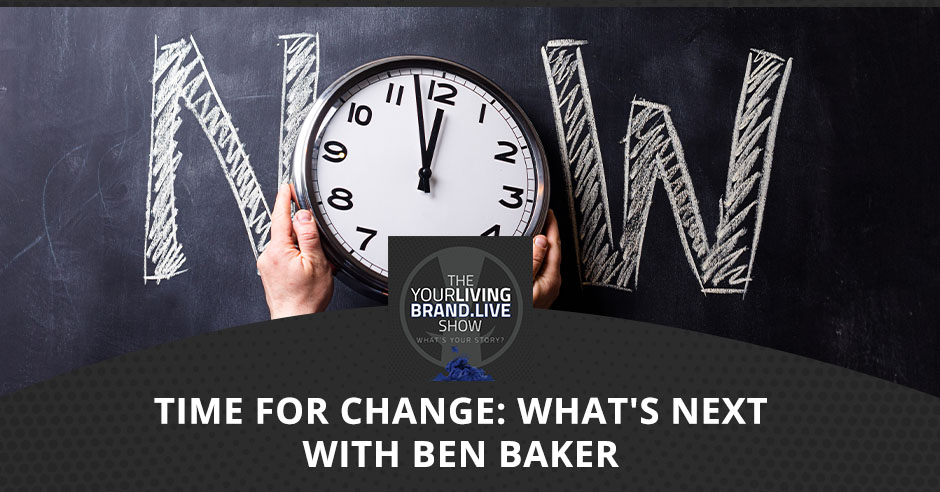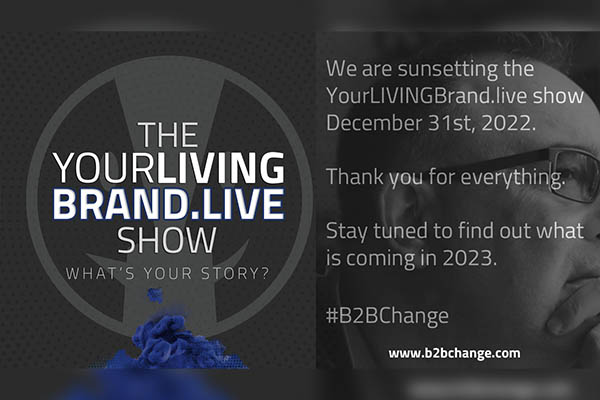
Welcome to the last episode of YourLIVINGBrand.live. This might be the end of an era, but it also signals the start of a new chapter. In this final episode, your beloved host Ben Baker shares the reason for #sunsetting the #podcast and details the exciting news of what’s to come. Change is inevitable, and throughout the last year, the concept of change management and how it impacts an organization has been at the forefront of Ben’s thoughts. Join him as he introduces a new show called B2BChange that focuses on how people affect change more than anything else existing in the world today. It is about navigating change in a changing world.
Be a part of a community that enables positive change to happen.
—
Listen to the podcast here
Time For Change: What’s Next With Ben Baker
[00:01:27] Welcome to the last episode of the show. It’s been an amazing run over the last five and a half years. We’ve done 325 or more episodes and had some incredible guests. The reason why we’re sunsetting this show is I’m excited to tell you about something new. Over the last year, I have been doing a lot of thinking. That thinking revolves around change, change management, and how to change effectively because change happens slowly.
It’s not easy. It’s messy in the middle, but when we can create effective change, amazing things can happen. The problem is, as Harvard Business Review states, 70% of change management initiatives fail. If I talk to senior managers and senior leaders across North America over the last year, that number seems low. The reason for that is most organizations focus on process and procedure and forget about the people.
Change happens slowly. It's not easy. It's messy in the middle. But when we can create effective change, amazing things can happen. Share on XPeople are the X factor. The thing that we need to think most about when we’re thinking about change is the people. People come with their own hopes, wants, needs, fears, desires and challenges. Each one is an individual. They come to the table as individuals. They work together as a team of individuals. They may have a similar goal in mind, but each has their own objectives, why something is important to them, what they want to get out of it, what they need out of it, and how they want to be communicated with.
They want to be listened to, understood, and valued. We need to empower our people. We need to give them vision and not only vision of what we’re about to do, but why we’re about to do it, why that is important, what we’re going to achieve by achieving that goal, what would happen if we don’t achieve that goal, and how these individuals can all come together to make that change happen and be impactful participants in that change.
That’s something that we seem to forget about. We seem to forget that the people within our organization are the ones that, in the end, are going to make something effective in terms of change or not. We take all this time and go, “We need to change now. We need to do something.” I get that. We need to be perceived as doing something, but when we sit there and go, okay, “We’re going to change this,” and we don’t figure out beyond the process of the procedure how this is really going to work, how this impacts the people involved, if those people bought are in, if they understand why that change needs to happen, and why this is so important, they’re not going to get involved.
They’re not going to engage. They’re not going to roll up their sleeves and say, “I’m part of this change. I believe in this change. I want to see this change happen. I’m willing to do what it takes from my point of view to be able to make that change happen because I see the greater good. I see how my life individually will be better because that change happens.” To do this, we need great leadership. We need leadership that understands that it’s not just about automatons, AI, machine learning, technology, or creating that brand-new app. None of those things will affect change the same way that people will.

Yes, we need policies and procedures, but it’s not what the procedures are but why those procedures are in place that is important. We need to be able to let our people understand that. Let me tell you a story and go back over 100 years with the creation of the Panama Canal. This was something that was supposed to be the greatest achievement in engineering the world had ever seen.
Taking from the Pacific Ocean to the Gulf of Mexico and creating a way for steamships to bypass going around South America and be able to cut days, if not weeks, off the travel time, let alone the dangers that came with it, but everybody looked at it from an engineering point of view, “We need to move so much dirt today. We need to be able to blast so much dirt out of the walls. We need to be able to move people from this place to that place.”
It was all about logistics, but what they didn’t understand was thousands and thousands of people were dying. The reason they were dying was because they didn’t understand malaria and yellow fever. As soon as they took a step back and realized, “Wait for a second here. Nobody wants to come and work on this project. Nobody’s willing to dedicate themselves to this project because they see it as a license to their own death,” they needed to fix that problem first. They needed to sit there and say, “How do we eradicate yellow fever and malaria?”
That was done by cleaning up the beds, getting rid of the water, spraying things down, and building actual towns for people to live in. Instead of having them live in these tents in these closed quarters, they built cities where people could live more comfortably. They had mosquito netting and some type of cooling, so people weren’t out in 40-degree heat or 100-degree heat if we’re going to think of a Fahrenheit. To be able to live in these miserable conditions, they made it better for the human condition.
People all of a sudden realize, “They’re taking care of us as human beings. If they’re taking care of us as human beings, we’re willing to work a little harder. We’re willing to push through. We’re willing to go through these trials and tribulations because we can see what’s on the other side. We can see what people are trying to do. They are thinking about us as human beings and not as something like Lego bricks that are expendable, something that you can pull one out and put another one in and just keep moving forward.”
When we start thinking of people as people and not just as something replaceable on a whim, we start looking at the world very differently. We start looking at business differently. We start looking at change differently. That is what I want to impact. Those are the conversations I want to have. What are the conversations that have gone on and changed? What change projects have worked well? What hasn’t worked well? Why haven’t they worked effectively? What would you have done better? What would you have done differently? Who would you have gotten involved with earlier in the project?
That’s what our next show is going to be about. We’re calling it B2B Change. This is not just going to be a show. There are going to be training programs we’re going to build out, not only for senior leaders to be able to help them navigate change in a changing world, but we’re also going to work with junior leaders, first-time managers, and giving them the tools that they need to succeed.
None of this will be done easily and fast. All this will be done taking into consideration that there’s an ecosystem and that we need to look at the ecosystem. How do we look at the world as a whole? How do we take a look at business as a whole and realize how one part of change affects the other? How communicating through that change is important? How do we make sure that people are listened to, understood and valued? How do we make sure people are trained and coached? How do we make sure that people understand what is being said, why it’s being said and how they matter? That’s what B2B Change is going to be all about.
This is going to be something that we’re going to be working on for the next 60 to 90 days. I don’t want to throw this together. I don’t want this to be just another project that you put together simply, and then six months later, it has to change again. I want to create something that has a long-lasting impact. Over the next 60 to 90 days, that’s where I’m going to be. I’m not ignoring you. I’m not going to be thinking about anything else, but I’m going to be thinking about how I can make this more impactful for you. You can see the journey. We’re going to be building this out at B2BChange.com. You’ll be able to watch the website grow and get on a mailing list to be able to understand what the impact is and how this can help you and your organizations.
We’re going to be looking for guests. We’re going to be looking for conversations. We’re looking to build out a community. It’s about enabling change to happen. Change happens because people care, and a larger group of people care. That’s what I want to do. I want to build a community of people who care, want to change, learn how to change, and build the tools within their tool chest to change, and not become reliant on somebody else to change for you.

The people you need to be able to affect change and make change happen realistically more than likely are within your organization. People within your organization know what’s wrong. They know what’s not being done well. They know what they would fix if they could if only we listened to them. We need to listen to them. We need to empower them. We need to know that we believe in them. We hired them.
My goal is to give people the tools that they can be able to be successful on their own and to be those agents of change that we need, not only now but in 5 years, 10 years, or 15 years from now. This is my legacy, and I want you all to be part of it. Thank you for reading. Thank you for being part of the show for the last five and a half years. I’m hoping the B2B Change Podcast lasts another five and a half years, and we can impact as many people, if not more, as we have with the old show.
We can change perception and thinking, give people the tools to be successful on their own and build the next generation of change leaders who will be able to be successful where other people have not before them. Thank you, and I look forward to the next conversation. I’m signing off the YourLivingBrand.live show, but come join us at B2BChange.com. We look forward to seeing you, and we look forward to having you as part of the next conversation.
Important Links


